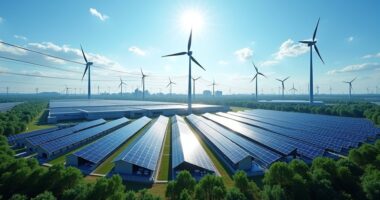Google faces a curious challenge: its emissions keep rising despite ambitious decarbonization efforts. With massive investments in renewable energy like wind and solar, the company aims for 100% clean energy. However, as demand for cloud services grows and AI models balloon in size, so too do the emissions. It’s like trying to lose weight while cooking up a feast! This paradox leaves Google grappling with sustainability goals that might feel a bit out of reach. Stay tuned to explore how they tackle this dilemma.
Google’s Emissions: A Growing Paradox
As Google continues its ambitious journey toward sustainability, one might expect a clear downward trend in its carbon emissions, yet the reality tells a different story.
Despite the tech giant’s extensive efforts to decarbonize, its emissions have surprisingly increased.
This paradox raises eyebrows, prompting many to wonder how a company known for its forward-thinking innovations could find itself in such a predicament.
Google has invested heavily in renewable energy sources, like wind and solar power, aiming to run its operations on 100% clean energy.
Google’s ambitious pursuit of 100% clean energy shines bright, fueled by investments in wind and solar power.
The idea is as appealing as a warm chocolate chip cookie fresh from the oven.
However, as its data centers expand to meet the ever-growing demand for cloud services and digital products, the sheer scale of energy consumption has outstripped these green initiatives. The training of large AI models contributes significantly to this growing carbon footprint problem.
It’s like trying to put out a forest fire with a garden hose; the effort is admirable, but the outcome is often less than effective.
Moreover, the challenge of balancing growing energy needs with sustainability goals resembles a high-stakes game of Jenga.
With every new service and cloud expansion, the tower of emissions wobbles precariously.
Google’s commitment to reducing its carbon footprint is commendable, yet it faces the classic dilemma of scale versus sustainability.
The company’s emissions are akin to a balloon that keeps inflating despite attempts to let air out; the more they pursue for greener solutions, the more the balloon expands.
Google has made strides in efficiency and innovation, like utilizing AI to optimize energy use.
In fact, data centers are now 84% more efficient than the industry average, yet, when one looks at the big picture, it’s clear that the road to a carbon-neutral future is riddled with challenges, especially as AI-related infrastructure demands are driving a significant surge in emissions.
So, while Google may be planting trees, the forest of emissions remains stubbornly intact, illustrating that even the most tech-savvy giants can stumble on the path to sustainability.
As the company forges ahead, the world watches, hoping for a plot twist that leads to a much greener chapter.









